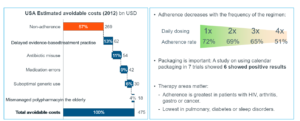We all know that the most expensive prescription is the one the patient does not take. Certainly, there are several factors that impact the decision for a patient to fill a prescription. Failure to comply with medication directions can also impact the health of the patient. These failures to comply can lead to more expensive health care costs down the road.
Doug Long, VP of Industry Relations at IQVIA, spoke briefly about the impact of noncompliance in his presentation in a webinar sponsored by Drug Store News today. As you can see from one of the slides he presented (reproduced below), the more frequently during a day a patient has to take their medication, the higher the percentage of noncompliance. In some chronic diseases (especially the silent diseases), those without any obvious symptoms (i.e., hypertension or high cholesterol) also contribute significantly to noncompliance. When money is tight, or the perceived benefit of a medication is not as great, the patient is more likely to not fill a prescription or skip doses. As noted in his slide, the greatest patient compliance occurs in disease states where the consequence of noncompliance can lead to dire outcomes, like cancer, arthritis (pain) or HIV.
The entire presentation can be found here . It also includes a market update and the impact that COVID 19 has had on the prescription drug market.





